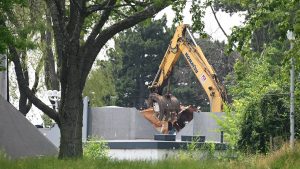A crane-swing case filed for hearing in B.C. Supreme Court (BCSC) is underscoring the importance for developers to have their air-space agreements in place as well as underpinning agreements before conflicts arise.
“It looks bad when the first communications (with the neighbours) is after the crane is there,” said Vancouver lawyer David Martin, a partner in Stirling LLP, who has represented both developers and now mainly homeowners who find themselves next door to a major development with deep excavation requiring underpinning work and towering cranes swinging over their property.
“We have about five to seven of these (agreements being negotiated) at any given time,” he said, indicating forging agreements is becoming increasingly common as urban densification occurs and homeowners guard their property rights.
Martin is not involved in the latest BCSC litigation nor is he commenting on the case specifically but rather on his comprehensive article on his firm’s website which sets out key points to consider when forging an agreement. The article over the years has garnered interest from across �°������ϲʿ������2023 and queries from even New York, he said.
Martin said that property owners are often unaware of their air space rights and the right to compensation.
Developers have been known to either ignore them or offer a token amount – $2,000 to $10,000 – for rights. These figures are below what is now paid, he said, adding compensation is based on a number of factors such as the project’s scale, lifespan and air space intrusion with average rights obtained for $100,000 to $150,000 albeit long-term developments can see figures climb to $350,000 and higher, he said.
In the latest litigation, Vancouver residents David Beckow and Susannah Kellet have filed in BCSC against StreetSide Developments, a division of Qualico, which bills itself as one of Western �°������ϲʿ������2023’s largest fully integrated and privately held real estate companies. Its six-storey condominium Bailey project is next to the couple’s property.
In early May, the couple contacted StreetSide asking the crane not be left over their house when not in use and proposed a crane-swing agreement.
In mid-May StreetSide’s draft agreement was returned by the couple to the developer with the revision that they “could only agree to a reciprocal easement or a fee payment for a one-way license agreement,” according to the lawsuit.
The plaintiffs maintained StreetSide acknowledged property encroachment and would continue to do so. They were unable to reach accord.
The lawsuit claimed “the crane has been repeatedly left in a position where it swings or is suspended for several consecutive hours” about 15 metres over their property and this was “posing a safety risk, causing considerable anxiety and interfering with the plaintiffs’ use and enjoyment of their home.”
The couple seeks a declaration of trespass, an order preventing the developer from committing a nuisance, damages for trespass and nuisance and punitive damages.
Martin said there is no requirement that is he aware of within municipalities that developers have underpinning and crane-swing agreements in place prior to being granted a building permit as most local authorities leave such arrangements to developers.
Canadian court cases regarding crane-swings infringing property air space have been evolving with the occurrence deemed either a nuisance (no injunction granted) or considered trespass (injunctions granted).
The case ruled the intrusion a nuisance compensable by any damages if proven. But since that ruling, there have been other Canadian cases that have leaned towards trespass.
The 2020 ruling of , saw a hotel property owner gain an interim injunction against a developer.
OSED Howe and FS Properties had an agreement in place, which included operating hours, but in March FSP advised the licensed hours were too restrictive as it had determined overtime would cost $1.5 million. The next day FSP began crane operations in OSED’s air space without consent.
The court held that a crane entering a party’s air space without consent was trespass, which unlike nuisance does not have to prove damages.
Martin said both developers and owners are best advised to get agreements in place before work begins in order to reduce unnecessary costs for the developer and both parties agree on the work regime. Developers can also opt for alternatives, such as moving cranes to limit exposure to property air space, he said.





Recent Comments
comments for this post are closed